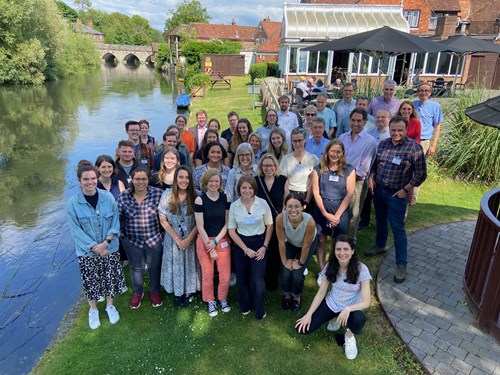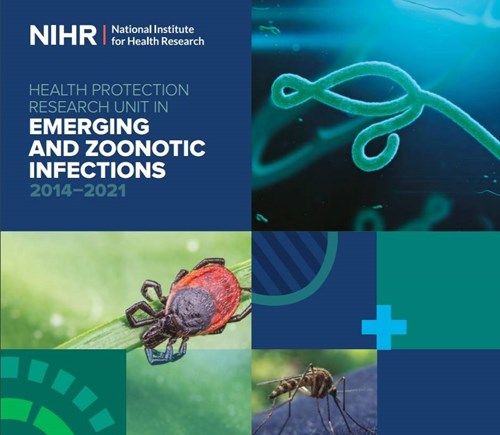About Us
The National Institute for Health and Social Care Research (NIHR) is the UK's largest funder of health and care research and provides the people, facilities and technology that enables research to thrive.
NIHR Health Protection Research Units (HPRUs) undertake high quality research that enhances the ability of the UK Health Security Agency to protect the public’s health and minimise the health impact of emergencies.
The NIHR HPRU in Emerging and Zoonotic Infections (EZI) is one of 13 HPRUs across England, part of a £80 million investment by the NIHR to protect the health of the nation. The NIHR HPRU EZI is a partnership between UKHSA, University of Liverpool, Liverpool School of Tropical Medicine, University of Oxford and London School of Hygiene & Tropical Medicine.
About HPRUs
Each NIHR HPRU undertakes high quality research that is used by the UKHSA to keep the public safe from current and emerging public health threats.
The NIHR HPRUs focus on collaboration and knowledge sharing, and play a pivotal role in maintaining and growing the UKHSA's scientific expertise and future workforce. The multidisciplinary centres of excellence also deliver responsive research to tackle emerging or potential public health emergencies.
About the NIHR
NIHR's mission is to improve the health and wealth of the nation through research. The NIHR was established in 2006 and is primarily funded by the Department of Health and Social Care.
Working in partnership with the NHS, universities, local government, other research funders, patients and the public, the NIHR delivers and enables world-class research that transforms people’s lives, promotes economic growth and advances science.
About the NIHR HPRU in Emerging and Zoonotic Infections

The NIHR launched a competition in 2013 to establish these new partnerships between UK Universities and the UKHSA – Health Protection Research Units (HPRUs). The University of Liverpool, in partnership with Liverpool School of Tropical Medicine and UKHSA, was successful in being awarded the HPRU EZI. We were joined by University of Oxford with the first renewal of the award in 2020 and by London School of Hygiene & Tropical Medicine for the renewed programme in 2025.
The HPRU EZI, led by Professor Tom Solomon CBE, supports and strengthens UKHSA in its role protecting England from emerging infections and zoonoses (i.e. those which spread from animals to humans). It brings together internationally leading researchers, exploiting synergy, world-class facilities, and breadth and depth in relevant research between these institutions. Alongside Professor Solomon of University of Liverpool, Co-Directors are Dr Richard Vipond of UKHSA, Professor Jonathan Ball of LSTM, Dr Jake Dunning of the University of Oxford and Professor Emma Thomson of LSHTM. New major collaborators include the Centre for Virus Research at the University of Glasgow, and The Pandemic Institute, Liverpool.
Specific Goals and Objectives
- Support the UKHSA in its immediate tasks of understanding and mitigating currently emerging infections and zoonoses
- Examine factors involved in emergence to help predict future threats
- Maintain a 'Rapid Response Team' of core staff, skilled in epidemiological, clinical, diagnostic, health economics and modelling approaches, to readily tackle emerging requirements.
- Train a cadre of scientists in the necessary disciplines, and develop streamlined structures and systems to support them.
- Generate sufficient external funding to support the HPRU going forwards
We will achieve our objectives through five research themes:
- Predict and Prevent
- Clinical Characterisation
- Non-Pharmaceutical Interventions
- Medical Countermeasures
- Data, Modelling and Artificial Intelligence
The impact of our work will be to significantly increase the UKHSA's ability to tackle current and future threats, thus informing policy, enhancing decision making, strengthening services and facilitating responses.

